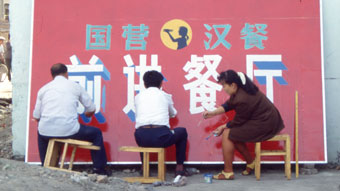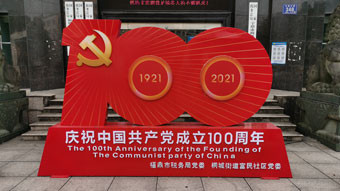China's media dilemma
This Communist government has long held tight controls over information released to the public
Through the 1990s, absent the Internet and social media to contend with, China was able to almost completely obscure news of terrorist attacks, thereby removing much of their appeal by removing the audience.
For example, Western media reported a bombing campaign that targeted public transportation and cinemas in Urumqi in February 1992, but emphasized that “China’s state-run media have not mentioned the bombings, although they happened almost three weeks ago.”
China’s state-run media have not mentioned the bombings, although they happened almost three weeks ago

Even today, government control over the reporting of terrorist attacks is explicitly written into the 2015 counterterrorism law, which states, “The Counter-Terrorism Leading Group is responsible for releasing information on terrorist incidents, their developments and the government’s responses.… No other units or individuals are allowed to disseminate details of the incidents that may lead to copycat actions, nor may they spread cruel or inhuman images of the incidents.”
Despite the government’s pervasive surveillance, China is nonetheless an increasingly connected society where information can spread organically and unpredictably, and the Chinese Communist Party (CCP) is deeply sensitive to public opinion and domestic pressure. Rapid evolution in the means and effectiveness of social control intersects with equally momentous changes in both governmental media control policies and technology that makes communication easier and censorship more difficult. While these changes can be a positive development in many domains, the rewards are less clear when it comes to terrorism and counterterrorism.
Despite the government’s pervasive surveillance, China is an increasingly connected society where information can spread organically and unpredictably
The long-term benefits of transparency
 The CCP has several compelling reasons—both international and domestic—to acknowledge terrorist violence promptly in its official media when it occurs. The CCP has strategically emphasized (and overemphasized, embellished, and invented) incidents of Uyghur political violence in order to link its policies in Xinjiang and Central Asia to the broader global war on terrorism. Pursuit of this goal weighs in favor of loudly and rapidly highlighting Uyghur violence when it occurs.
The CCP has several compelling reasons—both international and domestic—to acknowledge terrorist violence promptly in its official media when it occurs. The CCP has strategically emphasized (and overemphasized, embellished, and invented) incidents of Uyghur political violence in order to link its policies in Xinjiang and Central Asia to the broader global war on terrorism. Pursuit of this goal weighs in favor of loudly and rapidly highlighting Uyghur violence when it occurs.
In the post-9/11 context, the Chinese government clearly recognized the long-term benefits of internationalizing domestic terrorism in Xinjiang by linking it to global counterterrorism efforts, thereby insulating China’s policies from critique.
The global fixation on militant Islamist movements provides a useful and easy rhetorical context for Uyghur violence—this is, after all, emanating from a Muslim minority bordering Afghanistan in the heart of Central Asia. In that context, it was difficult for Western leaders to credibly condemn Chinese policies, and particularly for the United States to do so, if the situation in Xinjiang can be successfully framed in terms of terrorism and international jihadism.
The global fixation on militant Islamist movements provides a useful and easy rhetorical context for Uyghur violence
International attentiveness to violence in China is, however, generally short-lived, so authorities risk wasting an opportunity if they obscure an incident by delaying official acknowledgment. Framing violence in terms of terrorism also provides justification for China’s expansive military, political, and economic ambitions in Central Asia.
The Shanghai Cooperation Organization (SCO) was formed with the explicit charge to fight against the “three evils” of separatism, extremism, and terrorism. It is rhetorically useful for the Chinese government to promptly and officially acknowledge terrorist attacks in order to highlight the severity of these “evils” and bolster the SCO’s credibility as a nascent collective security institution. This is particularly important because, while the “three evils” are the organization’s raison d’.tre, there has always been suspicion that China’s regional policies are actually driven by larger strategic concerns—the desire to dominate Central Asia, counter US influence, and bolster the Belt and Road Initiative.
The Shanghai Cooperation Organization was formed with the explicit charge to fight against the 'three evils' of separatism, extremism, and terrorism
Finally, and most importantly, information transparency bolsters the Party’s long-term legitimacy. The link between transparency and Party legitimacy is well documented in the Chinese context. Researchers have found that exposing Chinese citizens to news regarding labor disputes promotes the perception that the Party and Chinese law favor workers, which helps increase the Party’s popular legitimacy. Similarly, studies have found that the Chinese label this type of media representation “bad apples but happy endings,” as the reported disputes are usually resolved positively in favor of the rights of workers.
The Party has grown increasingly explicit in the linkage it draws between transparency and legitimacy, and it is clearly cognizant of the positive returns that can accompany quick, official acknowledgment of negative events. Chinese policy circles talk about avoiding the “Tacitus Trap”—shorthand for a permanent loss of credibility, as the Party’s every subsequent action after some threshold would be viewed as a lie. The Roman senator and historian Tacitus once said, “Indeed, when a ruler once becomes unpopular, all his acts, be they good or bad, tell against him.”
For example, as a kindergarten abuse scandal came to light at the end of 2017, Chinese “netizens” blamed the government for failing to release enough information about the investigation process in a timely manner. Internally, Chinese officials referred repeatedly to the kindergarten incident’s potential to mar the Party’s credibility in the longterm—explicitly invoking the Tacitus Trap.
In 2014, Xi Jinping touched on the problem of eroding credibility at an enlarged meeting of the Lankao County Party Committee convened to discuss corruption. Xi is quoted as saying, “We are certainly not there [falling into the Tacitus Trap] yet, but the current problem facing us is not trivial either; if that day really comes, then the Party’s legitimacy foundations and power status will be threatened.”
The problem is not entirely hypothetical—the CCP’s failure to acknowledge officially high-profile incidents has proven costly in some key cases, with public outrage outstripping the official response and risking stability.
The school collapses in the Sichuan earthquake and a high-speed rail crash in 2011 are well-known illustrations of the risk of seeming to ignore incidents that are highly relevant to the public. But the issue continues to plague the Party.
This insight is echoed by recent work on China’s social media, which has revealed that the scale of censorship of sensitive materials on the Chinese microblogging platform (Sina Weibo) is more limited than commonly appreciated—a pattern attributed to the government’s desire to gauge bottom-up public opinion and provide an outlet for it.